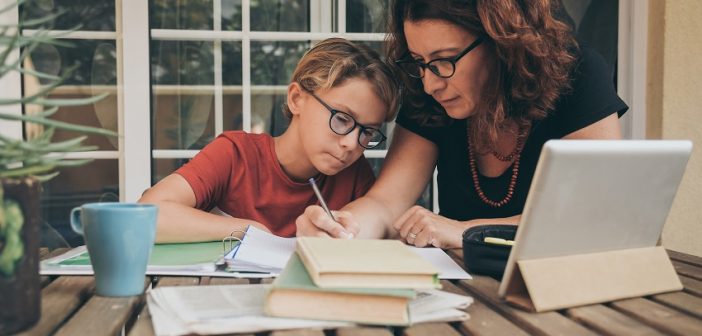Study comes easily for some children but is a real struggle for others. Considering current circumstances, even the most diligent of school students may sometimes find it difficult to get into a good study routine.
Whether your student needs little support, or all the encouragement they can get, these five tips will help your child study more effectively.
-
Create a study schedule
The hardest thing for your child may simply be knowing where to start when they sit down to study. You can help them eliminate decision fatigue and manage their study time more effectively by creating a master schedule.
Start off with an agenda for the upcoming weeks or term. Either alone or with your help, have your child record the due dates for all their assignments and exams in a paper planner (such as their school diary) or a digital one (such as an online calendar). Include other important things they’ll need to factor in, such as family functions and training for sports or hobbies.
You can even set deadlines a few days before actual due dates, to create a buffer for emergencies.
Next, estimate how much time your student needs for homework, assignments and exam prep. For example, estimate how much time they need for each project. Calculate this into a weekly or daily amount and block out corresponding chunks of time in their planner. Color-coding the different subjects/activities helps make the schedule easier to follow.
Remember to include time for breaks and relaxation, too. Consider using rewarding activities for successful completion of study time, such as a bike ride, trip to the park or some device time. Just be sure breaks don’t encroach into the next study session!
-
Create an effective study environment
Having an inviting place to study can make it easier to get started. It’s important your child has a study environment that’s distraction-free and quiet enough to facilitate focused work. Avoid letting them study near the television or noisy family activities.
Your child’s age will influence how much parental supervision they’ll need, especially if they’re using the internet. Younger children can do well with a space at the dining table, where you can supervise and help if needed.
Your child doesn’t necessarily need a dedicated room or desk, although senior students may find it helpful. If possible, give your student some freedom to personalise their study space. They may like to decorate it with pictures of friends, family, pets or their favorite sports stars. They could make sticky notes or cards with inspirational quotes or Bible verses. Even simple things like allowing them to choose their stationery can help them ‘own’ their space.
How about listening to music? Unfortunately, there’s no simple answer to the question of whether it’s helpful or detrimental to study. Some research has suggested that listening to music can ease stress, reduce test anxiety and enhance performance. However, other evidence indicates it can impair test performance.
So, what to do? If your child is listening to music and seems to be focused on their work, it’s a good sign. However, if they’re distracted by it, music probably isn’t helping them study.
-
Keep the big picture in mind
Study rarely feels like fun at the time, but it’s an important part of achieving your goals. Studying also helps your child develop important life skills such as self-discipline, focus and delaying gratification.
When your student is struggling, it may help to remind them why they’re doing it – to expand their opportunities for creating a successful and fulfilling life. Encourage them to see study as part of the bigger picture, such as getting the grades they need for university, using their gifts and talents to serve others, or working towards a career that makes people’s lives better.
Quality education is the fourth of 17 Sustainable Development Goals identified by the United Nations. Remind your child that education is a privilege that supports better global outcomes, such as reducing inequality and fostering more peaceful societies.
-
Harness the power of their preferred learning style
A learning style is the way a person most easily absorbs and processes information. Discovering your child’s learning style can help them play to their strengths and optimize their study routine.
Researchers have described up to ten learning styles, but a popular approach is to divide them into three categories:
Auditory
These learners best absorb information by listening. Help your auditory learner by encouraging them to listen to things like podcasts, video clips, and recorded learning modules or discussions. Have them explain ideas verbally and discuss them with others.
Visual
Visual learners absorb information by seeing it. Activities like practical demonstrations and videos are helpful, as are looking at charts, graphs and other visual representations of information.
Kinaesthetic
These learners do best with opportunities to perform a task. Try incorporating activities such as field trips and practical, hands-on training. Your kinaesthetic student may need to move around or fidget while they’re learning. For example, they could do star jumps while memorizing times tables.
It’s important not to focus excessively on learning styles, however, as your child also needs to develop skills to learn in different ways.
-
Prioritise good health
Children and young people can focus and learn best when they are physically and mentally healthy. Good nutrition, adequate physical activity and sleep helps them perform at their peak.
After school, avoid sweet treats that cause an energy high followed by a slump. Instead, opt for nutrient-rich, healthy snacks.
Physical activity enhances learning and memory as well as supporting physical and mental health. National guidelines for school-aged children and adolescents advise 60 minutes or more of moderate-to-vigorous physical activity daily. Activities that strengthen bones and build muscles should be included three days per week.
Adequate sleep is also crucial. The American Academy of Sleep Medicine recommend children aged 6 to 12 should regularly sleep 9 to 12 hours per night for optimal health, while 13 to 18-year-olds need 8 to 10 hours.
Managing screen time is also important. The American Academy of Child and Adolescent Psychiatry note that too much can lead to issues such as sleep and mood problems, poor self-image and lower school grades. See their guidelines for further advice and information.





Amazing tips to help and support the child study more effectively.
Thanks for the amazing article.
it’s a pity that no one has given me such advice before. It was very difficult to get children to do something when they were studying. But now you can try these tips on your grandchildren))
And I will definitely share this information with my daughter, who helps in the development of nursing capstone project ideas.
I enjoyed reading your wonderful article. There are lots of such tips on the web, but yours are the best along with study tips from Custom-Writing team.
I know that these are really useful tips because everyone faces problems with their children’s studies. Well, if you need any help regarding choosing the best video school for your children then you must visit janeson co services which will help you out with your problems.
I am against forcing a child to learn something that he does not like. He must find what he likes. And if he is not able to write a good work, it will be much more effective to transfer the task to the paper writing service reddit, and spend this time to developing it in the area that she likes best